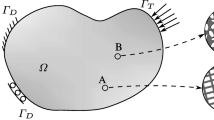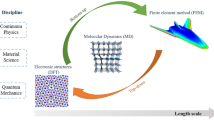Abstract
This paper makes an approach to the approximate optimum in structural design, which combines the global response surface (GRS) based multivariate adaptive regression splines (MARS) with Move-Limit strategy (MLS). MARS is an adaptive regression process, which fits in with the multidimensional problems. It adopts a modified recursive partitioning strategy to simplify high-dimensional problems into smaller highly accurate models. MLS for moving and resizing the search sub-regions is employed in the space of design variables. The quality of the approximation functions and the convergence history of the optimization process are reflected in MLS. The disadvantages of the conventional response surface method (RSM) have been avoided, specifically, highly nonlinear high-dimensional problems. The GRS/MARS with MLS is applied to a high-dimensional test function and an engineering problem to demonstrate its feasibility and convergence, and compared with quadratic response surface (QRS) models in terms of computational efficiency and accuracy.
Similar content being viewed by others
References
Schmit L A Jr, Farshi B. Some approximation concepts for structural synthesis [J]. American Institute of Aeronautics and Astronautics Journal, 1974, 12(5): 692–699.
Schmit L A Jr, Miura H. Approximation concepts for efficient structural synthesis [R]. NASA CR-2552, 1976.
Barthelemy J F M, Haftka R T. Approximation concepts for optimum structural design-A review[J]. Structural Optimization, 1993, 5(3): 129–144.
Friedman J H. Multivariate adaptive regression splines [J]. The Annals of Statistics, 1991, 19(1): 1–67.
Chen V C P, Ruppert D, Shoemaker C A. Applying experimental design and regression splines to highdimensional continuous-state stochastic dynamic programming [J]. Operations Research, 1999, 47(1): 38–53.
Crino S, Brown D E. Global optimization with multivariate adaptive regression splines [J]. IEEE Transactions on Systems, Man, and Cybernetics-Part B: Cybernetics, 2007, 37(2): 333–340.
Richardson S, Wang S, Jennings L S. A multivariate adaptive regression B-spline algorithm (BMARS) for solving a class of nonlinear optimal feedback control problems [J]. Automatica, 2008, 44(4): 1149–1155.
Simpson T W, Clark C, Griebsh J. Analysis of support vector regression for approximation of complex engineering analyses [C]// ASME Design Engineering Technical Conference and Computers and Information in Engineering Conference, Chicago, USA. 2003, DETC2003/DAC-48759.
Toropov V, van Keulen F, Markine V. de Boer H. Refinements in the multi-point approximation method to reduce the effects of noisy structural responses [C]// The 6th AIAA/USAF/NASA/ISSMO Symposium on Multidis Ciplinary Analysis and Optimization, Bellevue, USA. 1996: 941–951.
Montgomery D. Design and analysis of experiments [M]. New York: John Wiley and Sons, 1991.
Taguch G, Yokoyama Y, Wu Y. Taguchi methods: Design of experiments [M]. Michigan: Amer Supplier Inst, 1993.
Loh WL. On latin hypercube sampling [J]. The Annals of Statistics, 1996, 24(5): 2058–2080.
McKay M D, Beckman R J, Conover W J. A comparison of three methods for selecting values of input variables in the analysis of output from a computer code [J]. Technometrics, 1979, 21(2): 239–245.
Author information
Authors and Affiliations
Corresponding author
Additional information
Project supported by the National Natural Science Foundation of China (Grant No.50775084), and the National Hightechnology Research and Development Program of China (Grant No.2006AA04Z121)
About this article
Cite this article
Mao, Hp., Wu, Yz. & Chen, Lp. Multivariate adaptive regression splines based simulation optimization using move-limit strategy. J. Shanghai Univ.(Engl. Ed.) 15, 542–547 (2011). https://doi.org/10.1007/s11741-011-0783-2
Received:
Revised:
Published:
Issue Date:
DOI: https://doi.org/10.1007/s11741-011-0783-2




